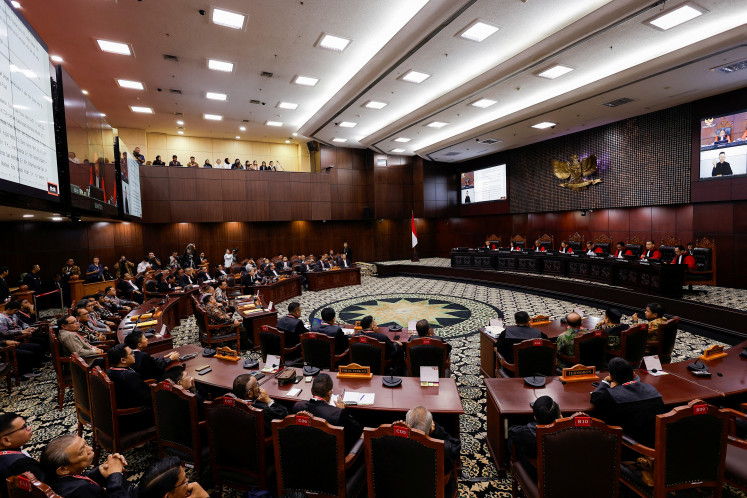Insight: Jokowi: Political change underway
Joko âJokowiâ Widodo marked the beginning of his presidential campaign by publishing an article in Kompas newspaper entitled âThe mental revolutionâ
Change Size

J
oko 'Jokowi' Widodo marked the beginning of his presidential campaign by publishing an article in Kompas newspaper entitled 'The mental revolution'. For those acquainted with cultural history, this motto may have given rise to some questions or even misgivings. This catchword is similar to Mao Zedong's Cultural Revolution in China or Otto von Bismarck's Kulturkampf in Germany as two political programs that brought about each country's disintegration.
Surprisingly, however, the mental revolution proposed by Jokowi has generated widespread enthusiasm among people while triggering wide-ranging discussions on social media. Kompas seemed helpless in trying to give space to hundreds of responses arguing for or against the idea. A new discourse was set in motion, which intellectually contested whether or not a political change in Indonesia could be best offset by a change in mentality; a radical reversal of outlook and attitude, leading to a different way of looking at things and the world.
As a matter of fact, there is an ongoing debate among social and human scientists as to the best starting point for social or political change; whether an expected change emanates from a material base of culture to a social base and then on to a mental base of culture, or the other way around. I, for one, tend to believe that social change can start anywhere at any level of culture, be it in the economy, social behavior or people's mind-sets, depending on the workings of many other variables.
In that connection, Jokowi has observed that although Indonesia's economy shows obvious growth, it has unfortunately only strengthened an oligarchy that has control over most of the country's resources, leaving most people stranded in their unchanged situation of poverty.
At the same time, many political institutions have been founded and brought into force without showing a significant change in social and political behavior. The Corruption Eradication Commission (KPK) has worked very hard to arrest and prosecute people guilty of graft, and yet there is no serious deterrence on the general attitude to steal public funds for private gain.
In the case of Indonesia's politics, all the stimuli at the material and social base of culture have turned out to be ineffective. Jokowi, however, has come to the fore saying: Let us start over again at the mental base of culture. Let us launch a mental revolution.
Jokowi is by no means a great political thinker, and yet he is blessed with good intuition and the ability to see which ideas are workable. He also has a great talent to implement his visions and to get things done. The mental revolution will become a core program during his presidency. Indeed, one can see that a mental revolution had already taken shape and worked effectively during his presidential campaign. Transactional politics and vote-buying practices were rejected by his followers.
More than 180 groups of volunteers in Jakarta (not to mention those in the regions) worked for Jokowi pro bono and spontaneously under their own financial and logistical means, oftentimes without central coordination. They were united in spirit and motivation, not in organization or within an institutional framework.
This spontaneous movement did its best to collect money to support Jokowi's campaign, resulting in an amount of Rp 295 billion (US$25.63 million). The contributors comprised people at all income levels, including some who could only donate Rp 1,000. All of them were acknowledged by Jokowi in his 1,008-page report on his campaign expenditure.
The same volunteer spirit is also discernible in the spontaneity of three young guys who used their information technology (IT) expertise to create a piece of software in just two days to help monitor the incoming votes for the two presidential candidates, from the village level through the subdistrict, district and provincial levels to the General Elections Commission (KPU) in Jakarta. This tremendous effort was born out of personal engagement without any financial support or sponsorship, and it was motivated by President Susilo Bambang Yudhoyono's appeal that every citizen should become actively involved in monitoring the vote counting.
Taking all these activities into account, one can safely say that the ingenious techno-savvy of the young IT experts feeds into Jokowi's vision to build an e-government structure in order to enhance both efficiency and transparency.
The thing is government officials must be willing and cooperation-minded to make use of the best talent in the country without feeling intimidated by smart young people, who are motivated to improve public services. Jokowi seems to be a leader who appreciates professional skill and dedication, and this will be one of the main criteria in selecting people to work with him.
There is a hope that Jokowi's vision for government can be realized in the near future, by capitalizing on what has materialized during his campaign in terms of the spontaneous initiatives taken by his supporters, who were fully committed to their cause rather than calculating everything in financial terms.
To put it briefly, the mental revolution is now underway, and the experiences during the presidential campaign have engendered a new ethos, whereby people will faithfully follow an elected leader when they know that the person in power is a living personification of his political vision.
____________________________
The writer is a sociologist and chairman of the Indonesian Community for Democracy (KID).









